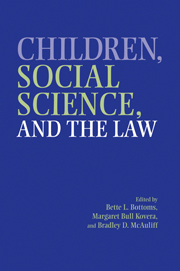Book contents
- Frontmatter
- Contents
- Acknowledgments
- Contributors
- 1 Children, Social Science, and the Law: An Introduction to the Issues
- PART I CHILDREN'S RIGHTS, THEIR CAPABILITIES, AND SOCIETY'S RESPONSIBILITIES TO CHILDREN
- PART II CHILDREN AND FAMILY CHANGE
- PART III JUVENILE AGGRESSION AND JUVENILE JUSTICE
- PART IV CHILDREN AS VICTIMS AND WITNESSES
- PART V CONCLUSIONS AND FUTURE DIRECTIONS
- 17 Starting a New Generation of Research
- 18 What Will It Take to Bring Child-Focused Law, Policy, and Research into the 21st Century? Concluding Thoughts
- Author Index
- Case Index
- Subject Index
- References
17 - Starting a New Generation of Research
Published online by Cambridge University Press: 24 July 2009
- Frontmatter
- Contents
- Acknowledgments
- Contributors
- 1 Children, Social Science, and the Law: An Introduction to the Issues
- PART I CHILDREN'S RIGHTS, THEIR CAPABILITIES, AND SOCIETY'S RESPONSIBILITIES TO CHILDREN
- PART II CHILDREN AND FAMILY CHANGE
- PART III JUVENILE AGGRESSION AND JUVENILE JUSTICE
- PART IV CHILDREN AS VICTIMS AND WITNESSES
- PART V CONCLUSIONS AND FUTURE DIRECTIONS
- 17 Starting a New Generation of Research
- 18 What Will It Take to Bring Child-Focused Law, Policy, and Research into the 21st Century? Concluding Thoughts
- Author Index
- Case Index
- Subject Index
- References
Summary
Bottoms, Kovera, and McAuliff have composed their book Children, Social Science, and the Law at a propitious time. We are at a natural point to look back at the ups and downs of interaction between the social sciences and the juvenile justice system. It has been a century since the establishment of the juvenile court and a generation since the Supreme Court's affirmation of the personhood of children and its command that juvenile courts follow the rudiments of due process (In re Gault, 1967).
The juvenile court began as the paradigmatic invention of the legal realists. The court was the entry point into a distinctive system designed to match the realities of life for wayward children and troubled families. Not only were the court's own procedures supposed to reflect knowledge about child development, but the court also acted as creator of new settings for family support, such as child guidance centers (Levine & Levine, 1992). Further, as the import of Gault became clear more than a half-century later, use of social science was a common feature in the panoply of children's cases in the appellate courts, whether testing the limits of autonomy for children on the one hand or applying special entitlements on the other (Mnookin, 1985). Indeed, the ostensible reliance on social science in children's cases has become so widely accepted that whether such work is cited no longer has much to do with judges' ideology (Hafemeister & Melton, 1987).
- Type
- Chapter
- Information
- Children, Social Science, and the Law , pp. 449 - 453Publisher: Cambridge University PressPrint publication year: 2002



